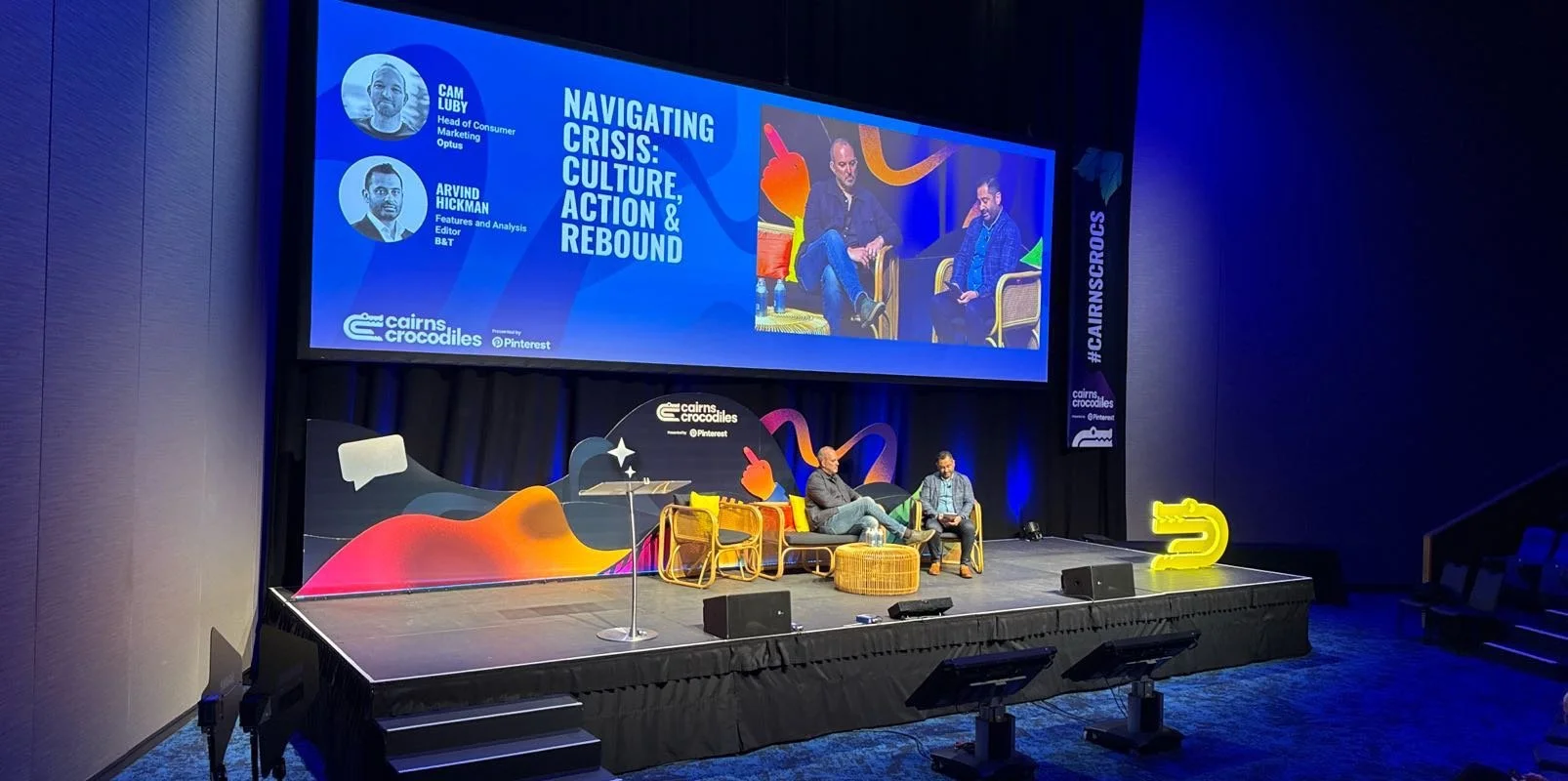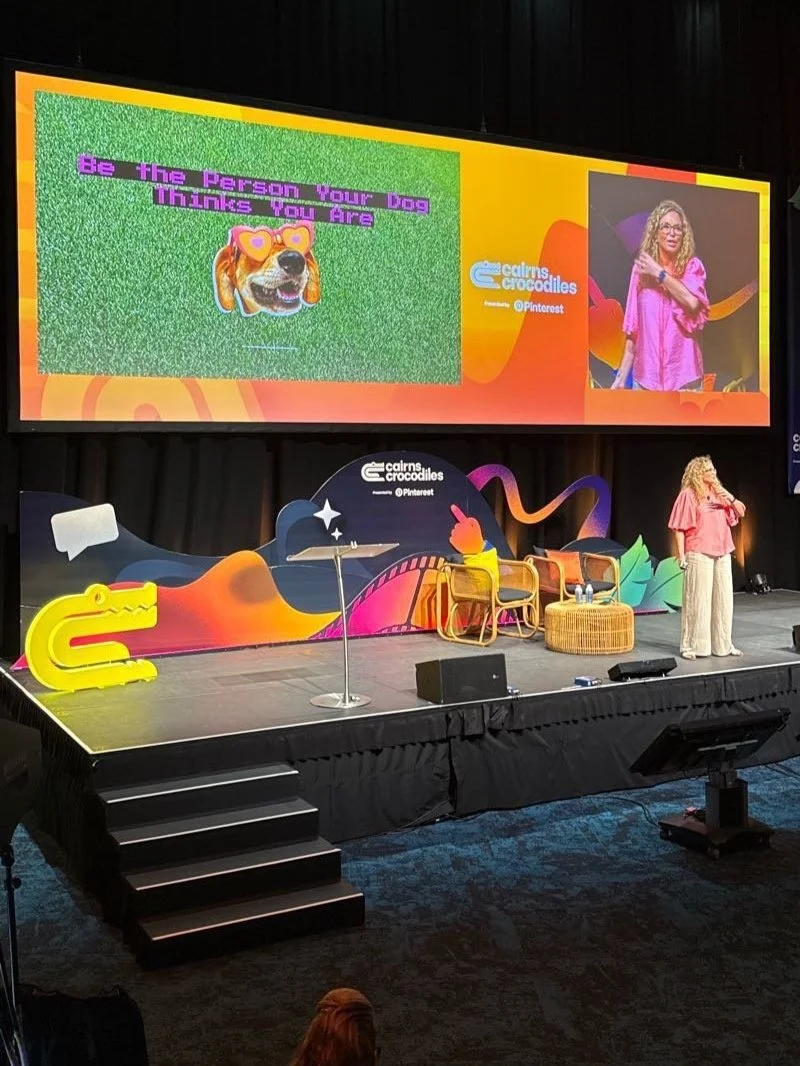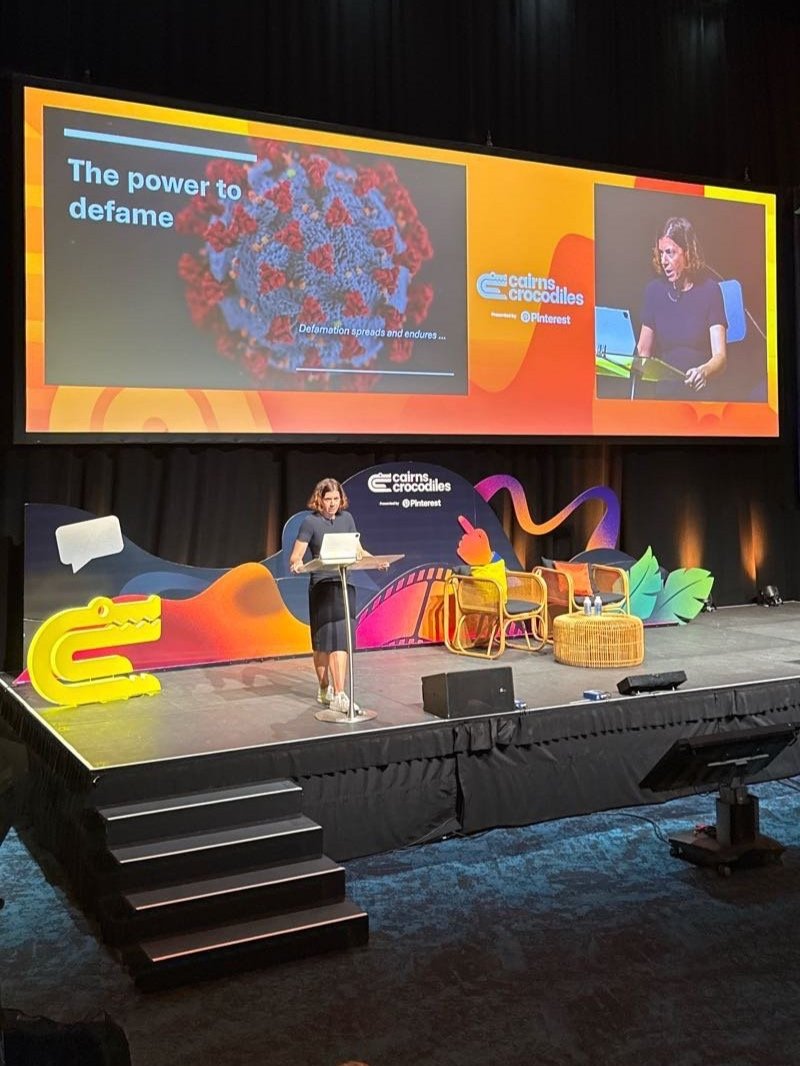Murderball, Misinfo and Moonshots: 5 Wild Take-aways from Cairns Crocs 2025
The advertising industry’s best and brightest gathered in Cairns to share knowledge, insights, and a ‘few’ drinks at Mexicairns last night. The spicy marguerites have left me a bit dusty, but hey, I’m not complaining! The Cairns Crocs Awards and inaugural Hatchlings Awards celebrated the industry’s established talent and rising stars. A huge congratulations to Annabel Cook and Maddy Merzvinskis from Re on winning the Hatchlings Design Award – a very proud win for me as Jury president!
The sessions covered everything from the revolutionary impact of Paralympic sports on Australian media to navigating corporate crises, the dangers of political polarisation, and the evolving landscape of defamation law. Each session offered valuable insights into how we can create more meaningful, impactful work in an increasingly complex media environment.
So, what did we learn? Let’s dive in.
1. MOVING THE NEEDLE: REVOLUTIONISING THE GAME WITH CHRIS NAY
Chris Nay
Chris Nay, the youngest CEO across all Olympic and Paralympic sports, has completely transformed Wheelchair Rugby Australia since his appointment in 2022. Under his leadership, what was once a small, poorly funded sport has become Australia's premier Paralympic sport, enjoying unprecedented growth after securing the largest disability sport broadcast deal in Australian history.
The Australian Steelers are currently world number one ranked, with Australia boasting triple the number of female players in its national team than any other nation globally. Nay’s adaptive mindset and innovative approach have revolutionised not just wheelchair rugby, but set a new standard for sports revenue, broadcast, and events.
Key insights from the session included the importance of understanding the mixed-gender nature of wheelchair rugby (the only Paralympic sport where men and women compete on the same team), the classification system that creates a level playing field, and the journey from a struggling organisation to a thriving, independent governing body.
As Nay put it: “We are Australia's favourite sport. They just don’t know it yet.”
WHAT YOU CAN STEAL
Know your worth: Nay emphasised how they stopped approaching media partners with a begging bowl and started recognising the value they bring. “I’m actually not interested to speak to you if you’re just going to use it as a media grab or in any way that’s disingenuous.”
Embrace your differences: Rather than trying to be like mainstream sports, Wheelchair Rugby Australia leaned into what makes them unique, turning potential challenges into storytelling opportunities.
Tangible vision over pipe dreams: Instead of just saying “we want to be mainstream”, they created a tangible North Star: “Boomers, Matildas, Steelers” - a clear, ambitious but achievable goal.
First domino strategy: Nay recognised that signing Fox as their broadcast partner was the “first domino” that changed everything. Identify your catalyst domino and focus on making it fall.
Creative partnerships: When an alcohol brand raised concerns about sponsoring a sport where many players have injuries from DUIs, Nay proposed creating “the world’s first accessible bar” - turning a potential objection into an innovative opportunity.
Cam Luby and Arvind Hickman
2. NAVIGATING CRISIS: CULTURE, ACTION & REBOUND
Cam Luby, VP Consumer Marketing at Optus, offered a candid look at how the telecommunications giant navigated two significant crises: a major cyber attack in 2022 and a network outage in 2023.
The cyber attack, at the time the largest known in Australia, created immediate reputational damage compounded by inconsistent communication. The network outage a year later reinforced challenges in crisis response and stakeholder management.
Luby shared how Optus learned that it wasn’t about mitigating damage but rebuilding trust through tangible actions rather than marketing spin. The company developed products like Network Pulse (allowing customers to see network status in real-time) and a seven-day network trial, demonstrating their commitment to transparency.
Their brand recovery journey followed what Luby calls the “down by the elevator, up by the stairs” principle – acknowledging that trust can be lost instantly but must be rebuilt gradually. The approach has been successful, with brand perception increasing by 23% over the past year, putting them just 3% shy of pre-crisis levels.
WHAT YOU CAN STEAL
Pre-crisis preparation trumps crisis response: “The things that you need to do beforehand are more important than the things you do in the moment.”
Use data, not anecdotes: Deploy quick polling to understand true public sentiment rather than being distracted by social media noise or press coverage.
Trust reveals culture: Crisis immediately exposes who in your organisation feels trusted to make decisions and who doesn’t. Build a culture of trust before crisis hits.
Demonstrate, don't declare: Australians told Optus, “You should spend less time making ads and more time doing valuable things and then talking about those.” Actions speak louder than words in rebuilding trust.
Celebrate incremental wins: Focus the team on gradual improvement rather than the drop experienced. As Luby put it, “Every single month we can see ourselves ticking up... that’s a really positive thing to take.”
3. DIVIDED WE SCROLL: WHY POLARISATION IS RISING - AND WHAT WE CAN DO ABOUT IT
Dee Madigan
In this session Dee Madigan (in her absolute brilliant, brutal way) explored the rise of political polarisation, examining how media consumption, social identities, and algorithmic biases contribute to increasingly divided societies. I was on the edge of my seat throughout this session!
The discussion highlighted how Americans’ media preferences now follow strict partisan lines, with completely different top 20 TV shows for Republicans versus Democrats. This reflects what political scientist Lilliana Mason calls “mega identity” - where faith, race, geography, and consumption habits all align under one partisan umbrella, making challenges to political views feel like personal attacks.
Social media algorithms amplify this division by rewarding emotional engagement, particularly outrage. What was designed as an improvement to Facebook’s algorithm (prioritising comments over likes) actually created a vicious cycle where the most divisive content receives the most promotion.
While Australia has historically been more centrist than the US, signs of polarisation are emerging here too, as seen in the 2019 election’s coal messaging and the 2023 Voice referendum, where misinformation spread rapidly through social platforms.
Small note: best slide of the conference: “Be the person your dog thinks your are”! Fab!
WHAT YOU CAN STEAL
Recognise polarisation traps: Both sides fall into them - the right with fear-based messaging, the left with purity tests and moral superiority that alienate potential allies.
Target the middle: Australia’s compulsory voting means elections are still won in the centre. When parties move too far to either side, they don't get rewarded.
Build media literacy: Teach people (not just kids) how to spot manipulative content, check sources, and step outside algorithmic echo chambers.
Pursue platform accountability: Social media companies can no longer claim to be “just platforms” rather than publishers - they need proper regulation.
Choose curiosity over being right: “The need to be right comes at a cost that’s too high.” Cultivate empathy, curiosity, and respect when engaging with opposing viewpoints.
4. THE TRUTH ON TRIAL: MEDIA, POWER, AND THE FIGHT FOR REPUTATION
Sue Chrysanthu SC
Sue Chrysanthou SC, a leading defamation barrister, discussed the evolving landscape of defamation law, highlighting how the internet has fundamentally changed the nature and permanence of reputational damage.
Chrysanthou noted that unlike physical newspapers that eventually became fish and chip wrapping, internet defamation is permanent, with no “right to be forgotten” in Australia. This digital permanence means anyone with internet access can cause lasting reputational damage, not just traditional media.
The session also explored new challenges in defamation law, including AI-generated content, the cross-fertilisation of stories across platforms, and the complexities of interpreting modern communication forms like emojis, slang, and song lyrics.
Chrysanthou criticised legislative changes that have consistently favoured media companies over individual plaintiffs, including damages caps and the requirement to prove “serious harm”. She contrasted Australia's approach with the United States, where cases like Alex Jones’ $1.4 billion defamation judgement demonstrate much higher financial stakes.
Look, anyone who unpacks a Kendrick Lamar song onstage at a marketing conference has got my vote, especially the “A-minor” moment (IYKYK). She is a true powerhouse of an intellect!
WHAT YOU CAN STEAL
Understand digital permanence: Unlike traditional media, online reputation damage doesn’t fade with time - it requires strategic management.
Recognise evolving communication: From emojis to song lyrics, defamation now comes in many forms that require careful interpretation.
Balance power considerations: While media companies present themselves as David against Goliath, legislative changes have consistently shifted power in their favour.
Verify before sharing: The ease of spreading potentially defamatory content makes fact-checking more important than ever.
Consider cross-platform implications: Stories now spread across multiple channels, making containment of reputation damage increasingly difficult.
5. BEYOND THE SCRIPT: HOW AUSSIE TALENT IS REDEFINING CREATIVITY
Poppy Reid and Miranda Otto
Miranda Otto, part of the Otto creative dynasty, shared insights from her diverse career spanning iconic roles in Lord of the Rings, Homeland, and The Chilling Adventures of Sabrina.
Otto discussed how creativity is innate in everyone but often stifled by judgement in schools, emphasising that creativity extends beyond arts to how we problem-solve and design our lives. Her father, Barry Otto, was a major creative influence who gave her freedom to explore her own creativity.
The session covered Otto’s journey from aspiring doctor to acclaimed actor, including her initial challenges at NIDA and the pressure of carrying a famous family name. She shared how moving overseas helped her gain independence and establish her own identity.
Otto highlighted the rising opportunities in Australian productions thanks to streaming platforms, allowing her to play local characters she feels strongly connected to. She also discussed the cultural differences between Australian and American comedy, noting that Americans take comedy more seriously with a greater obsession for perfection.
WHAT YOU CAN STEAL
Protect natural creativity: Everyone is born creative, but judgement often shuts it down. Create environments where creativity can flourish without fear.
Use geographical shifts: Sometimes changing locations can help you reinvent yourself and step up to new challenges.
Embrace cultural differences: Understanding variations in humour and storytelling approaches across markets can create more nuanced, effective communication.
Make every interaction count: Otto described how making a lasting impression on people can lead to opportunities years later.
Balance local and global: The most successful creative careers often blend local authenticity with global opportunities.
The Cairns sessions provided invaluable insights into how creativity, strategy, and resilience intersect in today’s complex media landscape. From Chris Nay’s revolutionary approach to Paralympic sport to Cam Luby’s lessons in crisis management, from the dangers of digital polarisation to the evolving challenges of reputation management, these sessions offer a roadmap for navigating the rapidly changing world of media and marketing.
As Miranda Otto reminded us, creativity isn't just for the arts - it’s how we solve problems, connect with audiences, and ultimately drive meaningful change. That's the rebellion we need to foster.
The Rebellion perspective
Fuel sub-cultures, not the monoculture
Take a page from Chris Nay’s playbook: identify niche communities, give them bespoke artefacts (mixed-gender “murderball” content, classification stories) and let their fandom do your media work.Rebound with proof, not promises
Optus didn’t slap on a “We’re sorry” campaign—they launched live network-visibility tools and trials. Tangible fixes first, brand love follows.Tie creativity to the bottom line
As Ana Andjelic and Optus both showed: break down “creative vs. commercial” silos by wiring every idea back to a CFO-approved metric—be it hit rate, incremental trust or acquisition lift.Vet every story for real-world risk
Sue Chrysanthou’s approach: run a quick defamation/AI-risk check on every script, post or deep-fake. Rapid corrections become brand assets, not liabilities.Celebrate brave failures
Miranda Otto’s mantra: creativity needs safe spaces to fail. Host regular “no-fail” labs where half-baked ideas are fuel, not fodder—for your next big leap.
Marketers today must think like game-changers, not campaign managers. The future thrives on enabling connection, not commanding attention. Brands ready to rewire organisational silos around these principles—embedding trust, community and tangible impact—will be the ones rewriting the narrative.
This is Rebellion Consulting, signing off from the croc-infested ideas delta. Stay bold, stay contrarian, and remember: you don’t just ride the wave—you create it.





